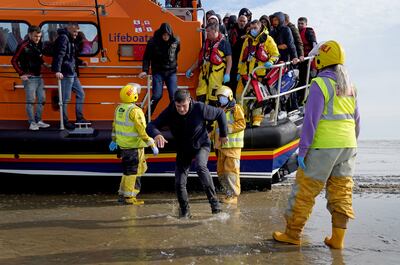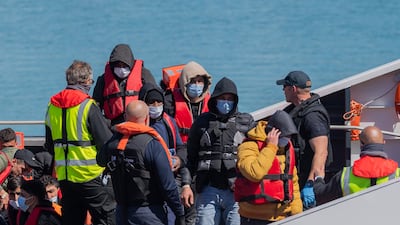People fleeing Afghanistan made up almost a quarter of the migrants crossing the English Channel in the first three months of 2022, as the number of asylum claims made in the UK has climbed to its highest in nearly two decades.
The backlog of applications waiting to be determined continues to soar, while the government's plan to deport asylum seekers to Rwanda has been delayed due to court action.
Out of 4,540 people detected arriving by small boats from January to March 2022, about 24 per cent (1,094) were Afghan citizens, Home Office figures indicated.
This was the most out of any nationality recorded, followed by 16 per cent who were Iranian (722) and 15 per cent (681) Iraqi..
The rise has prompted concerns from campaigners that the government’s resettlement scheme, set up after the Taliban takeover, is failing and raised questions over whether Afghans could be at risk of being deported to Rwanda because they could be deemed to have arrived in the UK illegally under new immigration rules.
The average number of migrants on board each boat crossing the Channel almost doubled in the first three months of this year compared to the same period in 2021, up from 18 to 32.
Crossings took place on 30 out of the 90 days.
A total of 9,330 migrants have reached the UK after navigating busy shipping lanes from France in small boats such as dinghies since the start of this year, analysis of government data by the PA news agency indicates.

A total of 28,526 people made the crossing in 2021, compared with 8,466 in 2020, 1,843 in 2019 and 299 in 2018, according to official figures.
Meanwhile, there were 55,146 asylum applications in the UK in the year to March 2022 – the highest number for any 12-month period since the year to September 2003, when the total stood at 61,343.
The number of applications from lone migrant children is also at its highest level for any 12-month period since records began in 2006. A total of 4,081 applications from unaccompanied asylum-seeking children were made in the year to March 2022.
The increase in applications was “likely linked in part to the easing of global travel restrictions that were in place due to the Covid-19 pandemic, and to a sharp increase in small boat arrivals to the UK”, the Home Office report said.
At the end of March 2022, there were 109,735 people awaiting an initial decision on their case, 66 per cent higher than the previous year when 66,185 people were waiting.
This is more than double the number in March 2020 when the coronavirus pandemic began (51,906) and is a new all-time high since current records began in June 2010.
The figures come as the Home Office announced it was setting up an action group to look at how to speed up the processing of asylum claims in a bid to increase the number of decisions made on cases on a weekly basis.
Amnesty International UK accused the Home Secretary of “disastrous leadership” over the figures, describing the Home Office as “becoming a byword for backlogs and dysfunction”.
Marley Morris, from think tank the Institute for Public Policy Research, said: “Today’s migration stats show a shocking rise in the number of Afghans arriving in the UK on small boats. The government has said it is giving Afghans a ‘warm welcome’, but these figures reveal that many have felt they have been left with no option but to take this dangerous route to make it to the UK.
“Now the government’s new plans in response to the Channel crossings could mean that Afghan asylum seekers will be sent to Rwanda. This would be an unimaginably awful outcome for people who have already faced such great hardship.

“Contrary to the government’s claims, there are few safe routes for people forced into small boats to make it to the UK.”
Enver Solomon, chief executive of the Refugee Council, said: “The sharp increase in the numbers of people fleeing Taliban atrocities in Afghanistan, having no choice but to make desperate journeys over the Channel to find safety here in the UK, is concerning but unsurprising.
“This increase is the inevitable consequence of the restrictive nature of the Afghanistan resettlement schemes, for which the vast majority of Afghans are simply ineligible.
“The government must honour the promises they made to the people of Afghanistan by immediately ensuring the most vulnerable people in the country are able to access a safe route to the UK, so they are not forced to risk their lives in order to find safety here.”
Dr Peter William Walsh, senior researcher at the Migration Observatory at the University of Oxford, said: “The arrival of Afghans in small boats on the UK coast indicates that many more wish to find protection here than are able to do so under the UK government’s existing schemes.”
The government pledged to resettle 20,000 refugees, with as many as 5,000 in the first year under the Afghan Citizens Resettlement Scheme (ACRS).
It relocated the first people on January 6, 2022 under the scheme almost six months after the Taliban took over Kabul in August. But questions remain over its progress.
This week, a British Army interpreter who has campaigned for the UK to evacuate his family from Kabul said Britain was continuing to “forget” about the people left in Afghanistan.
A damning report, released on Tuesday by the House of Commons Foreign Affairs Committee, concluded the UK's withdrawal from Afghanistan was a “disaster and betrayal” of British allies that will damage the nation's interests for years to come.
Meanwhile, an estimated 7,000 people have been relocated under the existing Afghan Relocations and Assistance Policy (ARAP) which started in April last year and offers priority relocation to the UK for current or former locally employed staff who had been assessed to be under serious threat to life.










